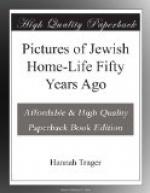“Very soon afterwards they found us a vacant dwelling, which Father was very thankful to get, and in my next letter I will tell you something of our life after we had moved in; but I must tell you more of what happened when we were staying with our kind host. The first afternoon, one of our visitors insisted on our I going to her home; so, when I and our youngsters arrived, we were taken to a room, and in it was a table covered with lovely apricots, and delicious-looking pastries and jams; also wine which only cost 3d. a bottle, so it is very nearly as cheap as buying water. When they handed us some of the good things we naturally took them and ate them.
“Suddenly I saw our host’s children move away from us saying: ’She is a Shiksa,’ and ‘He is a Shakitz,’ and they kept on whispering and pointing to us. I could not think what we had done to make them act in such a way, and so asked their mother. She answered: ’They are surprised to see you eating without making a Brocha (a blessing), for our children unless they first make a Brocha never taste anything.’
“You know, dear Milly, that, though we too were taught to do as they here, yet the hurry and scurry of going to school and the busy life in London have made us forget to practise these religious laws. We, however, felt very uncomfortable and ashamed of ourselves, and made up our minds to get into the habit of doing it—that is to remember to thank our Creator for every blessing we receive, including food—so that it should become a matter-of-course.
“Now I must tell you about our water-supply, for the scarcity of water struck us, very much, coming from London; for here every drop is precious and is used for several things, as every drop has to be bought, and money amongst our Jerusalem brethren is very scarce. In fact, it often costs more than the wine of the country.
“A water-carrier brings us up every morning a skin bag of water (it is made of skins sewn together, with a small outlet at the top); for it we pay twopence, which is equal to more than a shilling in London. The water that he brings he pours into a large earthern jar, which keeps it cool, and to it is attached over the mouth of the jar a sieve which is made of thick unbleached calico: if this were not done, hundreds of little red worms would get into the jar, because the water in Palestine is full of them. A law was made by the Jews that to drink water that had not been passed through a sieve was a sin; and, as little children are taught not to commit any sin, they do not drink any water that has not been passed through a sieve; owing to this, many illnesses are prevented among the Jews that are rampant among the Arabs and others.




